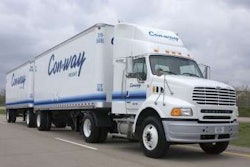A U.S. District Court judge on Monday, April 27, made a tentative ruling to enjoin several elements of the Ports of Long Beach and Los Angeles’ concession plans.
Following the March 20 guidance of the U.S. Court of Appeals for the Ninth Circuit, Judge Christina Snyder of the U.S. District Court for the Central District of California ordered an injunction against seven concession requirements that the American Trucking Associations had argued would regulate interstate commerce at the ports:
“We are pleased with the tentative ruling and look forward to Judge Snyder’s final decision later in the week,” said Curtis Whalen, executive director of ATA’s Intermodal Motor Carrier Conference.
Enjoining these concessions came after a three-judge panel of the U.S. Court of Appeals for the Ninth District unanimously ruled in favor of ATA on March 20 and remanded the case to the U.S. District Court, indicating that the judge should grant ATA an injunction against all or part of the concession plans that were tied to the Clean Truck Program, part of a massive five-year Clean Air Action Plan to reduce port truck emissions at the San Pedro Bay ports by 80 percent and emissions from all sources by 45 percent.
Beginning Oct. 1, 2008, the ports banned the most polluting trucks – 1988 and older vehicles – the initial ban in a series planned under the CTP. On Jan. 1, 2010, the ports will ban 1993 and older trucks, and unretrofitted model year 1994 to 2003 trucks. By January 2012, all vehicles 2006 and older will be banned.
“For the long-term air quality benefits our Clean Truck Program delivers to every Southern Californian, we are confident that Judge Snyder will weigh into her deliberations the program’s phenomenal success to date,” said Geraldine Knatz, executive director of the Port of Los Angeles. “In its entirety, our Clean Truck Program is designed to ensure that our port truck system remains clean, safe and secure well into the future.”
As of Oct. 1, 2008, any motor carrier out of compliance with a port’s concession agreement had been barred from entering that port, a situation ATA argued has caused motor carriers to suffer both short- and long-term capital losses and injuries to business goodwill. The appeals court’s instructions to the federal district court had made clear that many elements of the concession plans were to be enjoined, but left it to the federal district court as to whether the entire concession plans should be halted.
ATA had not challenged the ports’ CTP. “The Court of Appeals’ decision made very clear that ATA never opposed any of the environmental goals of the ports’ Clean Trucks Plan – just components that illegally regulated the drayage industry at the ports,” said Robert Digges Jr., ATA vice president and chief counsel.
ATA’s case is unrelated to the Federal Maritime Commission’s recent case against the ports, in which the U.S. District Court for the District of Columbia rejected FMC’s request for a preliminary injunction against the port’s CTPs. Judge Richard Leon concluded that FMC had failed to prove that the CTPs reduced competition, raised prices or caused irreparable economic harm.










